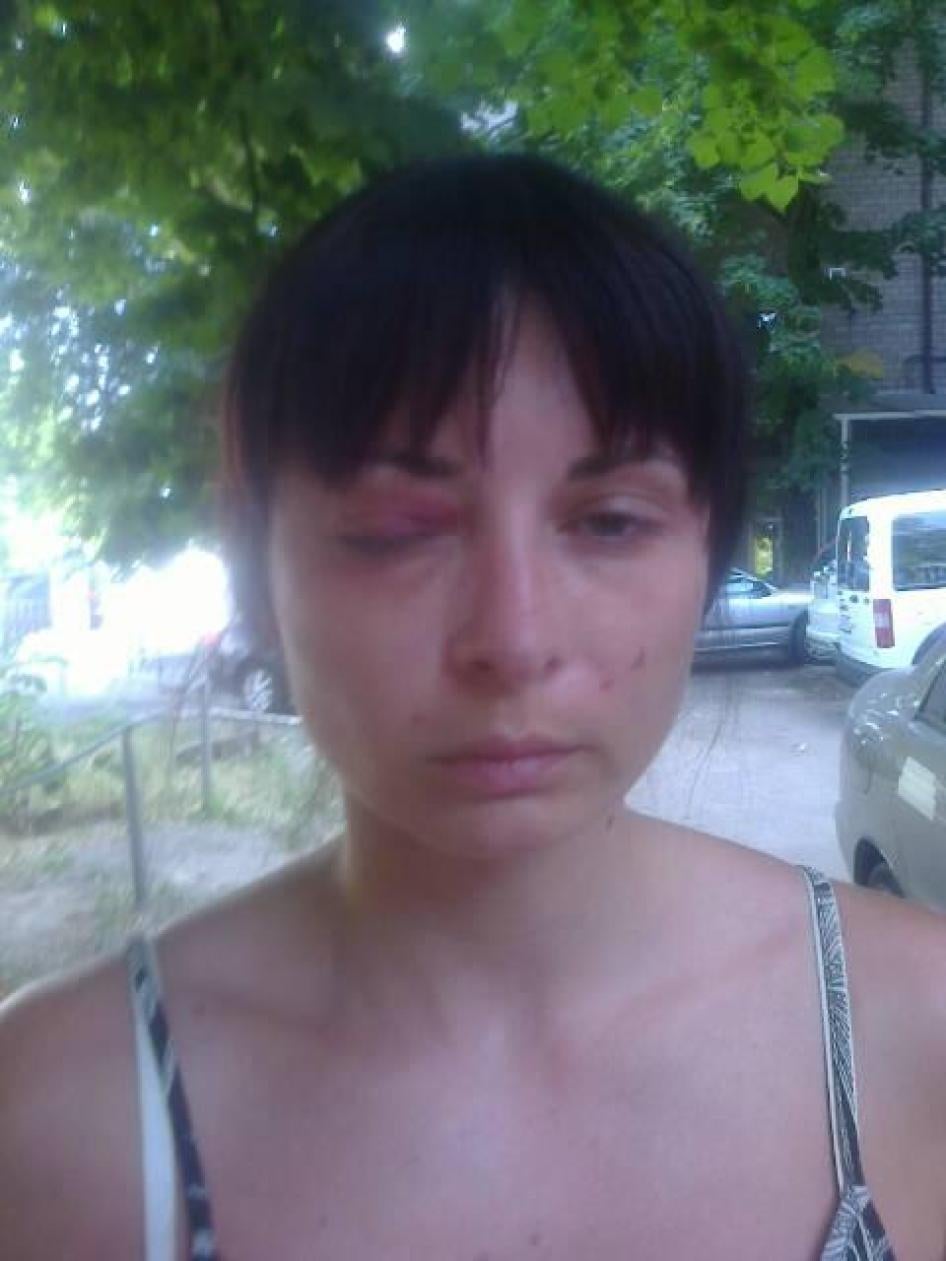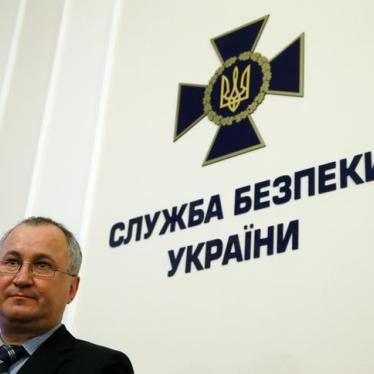(Berlin) – Ukraine’s Security Service (SBU) arbitrarily detained a Ukrainian woman, held her incommunicado, and tortured her, Human Rights Watch said today. The authorities charged the woman, Daria Mastikasheva, with treason, and a court in Dnipro has ordered her pretrial detention pending investigation.
Mastikasheva, 29, a Ukrainian citizen living in Moscow, was visiting her mother and her 10-year-old son in the town of Kamenskoye, in the Dnipropetrovsk region in eastern Ukraine. On August 15, 2017, the security services abducted her and held her incommunicado for two days. On August 17, the SBU head, Vasili Gritsak, told the media, that the SBU had opened a criminal investigation and charged Mastikasheva with treason and illegal use of weapons.
“Ukrainian authorities should immediately investigate the allegations that Mastikasheva was unlawfully detained and tortured,” said Hugh Williamson, Europe and Central Asia director at Human Rights Watch. “Ukraine has a record of torture and other ill-treatment in custody compounded by virtual impunity for such abuse.”
Mastikasheva’s mother told Human Rights Watch that Mastikasheva was planning to catch a bus on August 15 to return to Russia. Mastikasheva’s lawyer said she told him that she was in her own car at about 2 p.m. when two black cars blocked the way. Four armed men in black face masks jumped out, yelling “police” and “SBU” and hitting her car with their weapons.
They dragged Mastikasheva out of her car, pushed her to the ground, handcuffed her, put a mask over her head and pushed her into one of their vehicles. Then, the lawyer said, the men began to punch her in her stomach, chest, and head. When she asked what they wanted, they said she would find out soon.
The lawyer said that the men drove for several hours, then took Mastikasheva to the basement of an apparently abandoned building where they removed the mask, and she saw more SBU officers. She said she was held there overnight, and repeatedly tortured. She told the lawyer that the agents repeatedly put a plastic bag over her head, cutting off the air until she passed out. They ordered her to read a script on camera. She refused several times, she said, but agreed when the men threatened to hurt her mother and son.
The men gave her a text to memorize for the camera, which said that she was an agent of Russia’s Federal Security Service (FSB), and had travelled to Ukraine to recruit veterans of the armed conflict in eastern Ukraine to commit terrorist attacks in Russia, which the FSB would blame on the Ukrainian government. The head of the SBU later showed this video at the news conference on August 17.
Mastikasheva told her lawyer that on August 16, her captors put her in a car and drove her to the SBU headquarters in Dnipro, the administrative center of the Dnipropetrovsk region. They held her at the SBU headquarters for several hours and then took her to a place where her car was parked. The men searched the car and found grenades, explosives, detonators, maps of Russian towns and other documents and memory sticks that did not belong to her and had not been there when she was forced out of it earlier. They took her back to their Dnipro headquarters, holding her overnight in the pretrial detention facility.
On the evening of August 17, the SBU investigators questioned her in the presence of a lawyer for the first time. Her current lawyer said that during the interrogation, Mastikasheva retracted her confession and said that she had only made it under torture and when the agents threatened violence against her family.
On August 18, a Dnipro court ordered Mastikasheva detained until October 16, pending the investigation.
Mastikasheva’s mother said that she did not know her daughter’s whereabouts for almost two days despite repeated phone calls and visits to local law-enforcement agencies. She said that around midnight on August 16, several SBU officials came to search her country house. She asked to see a search warrant but they refused to show it. The SBU searched the house until 3:30 a.m., then left, having asked Mastikasheva’s mother to hand over her savings to them.
Mastikasheva’s mother saw her daughter for the first time in the morning of August 17, when the SBU took Mastikasheva to a Dnipro hospital for a forensic evaluation. The evaluation, which Human Rights Watch reviewed, stated that Mastikasheva’s injuries were minor and sustained a couple of days before her detention by the SBU, which they only acknowledged on August 17.
Mastikasheva’s mother said she saw her daughter very briefly, but took a photo of her with her mobile phone, which Human Rights Watch saw. The photo shows bruises and abrasions on her face. Her right eye is bruised, swollen, and completely shut. Her mother said that she also saw bruising on her daughter’s neck and arms, and that she could not walk independently and had to be assisted by SBU officers.
Mastikasheva’s current lawyer, who started working on her case on August 28, told Human Rights Watch that her first lawyer quit after he allegedly began receiving threats from the SBU.
He also said Mastikasheva, despite her repeated requests, had not received medical attention for her injuries and continues to feel unwell.
The lawyer said that the SBU also detained a man, Aleksandr Korotai, accusing him of helping Mastikasheva recruit Ukrainian war veterans for the FSB. The lawyer said that Korotai was also tortured and forced to give a false confession.
Torture and inhuman or degrading treatment of people in custody is absolutely prohibited under international law, and countries have an obligation to prosecute those responsible.
In 2016, Human Rights Watch, together with Amnesty International, documented that both the Ukrainian government authorities and Russia-backed armed groups in eastern Ukraine held civilians in prolonged, arbitrary detention, without contact with the outside world, including their lawyers and families. Human Rights Watch documented several cases that confirmed the secret detentions and torture of civilians in Ukraine security service custody. In some cases, the detentions constituted enforced disappearances, because the authorities refused to acknowledge the person was being held, or refused to provide any information on their whereabouts or fate.
Most of those detained suffered torture or other ill-treatment. Several were denied needed medical attention for resulting injuries. Human Rights Watch has not been able to identify any meaningful efforts to investigate the documented abuses and bring those responsible to justice.
A June 2016 report by the United Nations Human Rights Monitoring Mission in Ukraine noted that the cases of incommunicado detention and torture in Ukraine brought to their attention in late 2015 and early 2016 “mostly implicate SBU.”
“By grabbing civilians, disappearing, and torturing them, the SBU and other law enforcement authorities in Ukraine demonstrate appalling disregard for the rule of law,” Williamson said. “Mastikasheva’s horrific ordeal in SBU custody makes clear that civilians are being denied the most basic human rights protections and remain vulnerable to severe abuse.”









